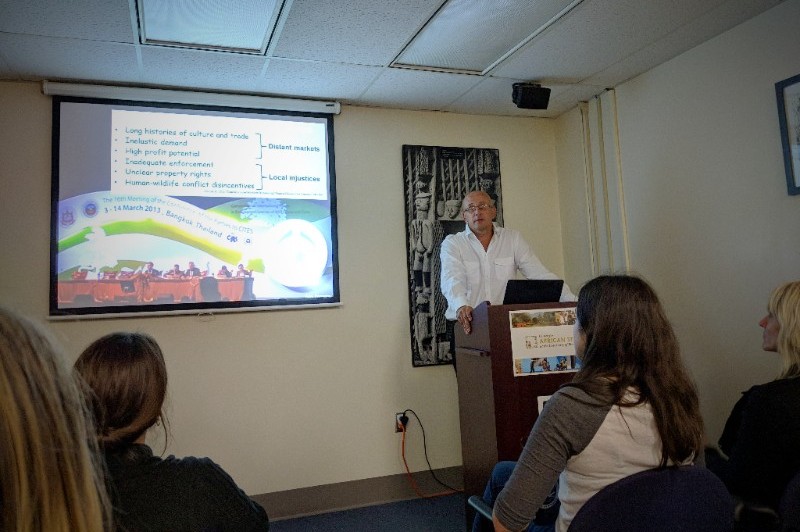 On February 1, Sam Ferreira (South Africa National Parks) lectured on “A Collage of Goliath Teachings; What Do Elephants and Rhinos Tell Us about Ourselves?” This presentation focused on the social and ecological factors of conservation at Kruger National Park, highlighting the management of elephants and rhinos. In the past, officials at Kruger utilized the idea that culling, or reducing wildlife populations, would allow for sustainable ecosystem management. However, tree populations in Kruger have been in decline since 1940, even during periods of elephant culling. Ferreira questions why these patterns occur, given traditional management practices.
On February 1, Sam Ferreira (South Africa National Parks) lectured on “A Collage of Goliath Teachings; What Do Elephants and Rhinos Tell Us about Ourselves?” This presentation focused on the social and ecological factors of conservation at Kruger National Park, highlighting the management of elephants and rhinos. In the past, officials at Kruger utilized the idea that culling, or reducing wildlife populations, would allow for sustainable ecosystem management. However, tree populations in Kruger have been in decline since 1940, even during periods of elephant culling. Ferreira questions why these patterns occur, given traditional management practices.
He argues that the management of elephants has different impacts at different places and times, so management should be adaptive and rely on the needs of wildlife for water, food, safety, and comfort. He also notes that when management intensity is low and there is no culling, regulating population dynamics take place to maintain sustainable elephant populations for that ecosystem. Water holes make elephants use landscapes more intensely and at the same place between seasons; in addition, the clustering of water holes also impacts elephant distribution within parks. Cultivating a “Landscape of Fear,” regions that have unpredictable patterns of danger, can also change landscape use causing elephants to spend less time at certain areas.
Ferreira concluded his talk by discussing poaching as a management issue, highlighting the impact poaching has had on South African rhino management. Drivers of poaching can be divided into two categories: distant markets and local injustices. Although many strategies have been attempted to reduce demand for rhino horn—including fear, punishment, and reinforcement—interventions must be sustainable and integrated to be successful. Ferreira argues that there is a need to disrupt organized crime through supply chains and “middlemen” involved in elicit trade. At the local level, he believes that social injustices should be remedied to reduce the likelihood of local people turning to poaching. This can be done through providing jobs and creating skills to improve the local workforce.